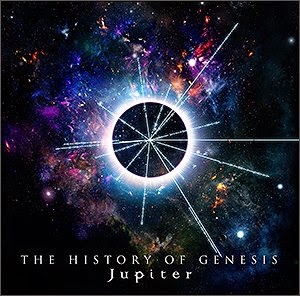There was a point in time where if you told me that Versailles was going to pause activities indefinitely and months later there would be two very similar projects forming from the ashes of my all-time favorite musical group I would have called you insane. Never in my life would I have imagined Versailles calling it a day so soon, but when they did I'm glad they didn't waste any time before the members got on their respective horses and carried on with their still flaw-free careers. While I do still think that Jupiter's debut was far, far more rushed than KAMIJO's was (which lead to a lot of people not appreciating Jupiter to their full potential, I think), their sophomore effort really proves that the talent and creativity of HIZAKI and TERU never went anywhere, it just needed time to blossom.
The album properly starts (and finishes) with epic length songs with pretty average length songs in between, which is likely the best way to do an album like this. It keeps the listener actively engaged in what each song sounds like while saving the biggest, in-your-face compositions for the intro and outro. "The Birth of Venus" is one of the better introductory songs to an album I've heard in recent memory. While it does set up expectations for the album, it isn't just a mood setter. The overall composition of the piece doesn't distract from ZIN's incredible and catchy vocals. The song is very triumphant and uplifting and came with a great promotional video as well (feel free to watch this amazing video on YouTube by clicking here). Following up the intro are two single songs: "Last Moment" and "Darkness," both of which I adore for different reasons. I feel like "Last Moment" is the song they were attempting to do with "Blessing of the Future," but had a certain je ne sais quois that was not present in any form in their original single. It's a somewhat longer-than-average song, but the fat was trimmed and the inexperienced vocalist now had a whole album cycle under his belt so he could really deliver an excellent performance in this era's lead single. "Darkness," on the other hand, is what differentiates Jupiter from not only KAMIJO's solo project, but Versailles as a whole. This song shows that ZIN is a way more convincing harsh vocalist and actually sounds really intense. While all projects involved are incredible at composition, Jupiter is now officially the only one who can pull off a heavy song with harsh vocals and sound not only passable, but exemplary.
TERU's first composition of the album is "B.L.A.S.T" and it falls a little bit short of his previous compositions (with Versailles, but I digress). While the song is not bad overall, there are parts that just sound generic and not very inspiring. Where TERU has composed extremely innovative heavy metal songs in the past, "B.L.A.S.T." doesn't actually add anything in terms of interest or intrigue. The drumming is too frantic, the bass is largely nonexistent, and while the guitars can be impressive very sporadically in terms of arpeggios, the rhythm of the song isn't as well thought out. Additionally, there is a lot of synth that detracts from the composition instead of adding to it. It's a song with a lot of misplaced energy and averagely-sung lyrics. Following such a hard, heavy-hitting song like "Darkness," the harsh vocals of this song really don't add anything to the experience. This high-energy song is followed up by the very low-intensity "The Moon" which has little to no energy whatsoever. Not that every song has to be something to dance to, but this song is barely intriguing. On second listen it became a different experience due to my adjusted expectations, but at the same time the execution of this song could have been done somewhat differently just to make it more interesting (i.e. the jazzy breakdown just around the 3 minute mark has no earthly business being there). What I can say about this song, though, is that it's the most different HIZAKI composition I've ever heard.
The album's third and final single is what serves as track six on The History of Genesis. Even though the song is my personal least favorite single, it definitely brings the album back on track after two lackluster songs. It brings the energy back around to an even-paced, not-too-heavy-not-too-light atmosphere. The composition is now more your typical HIZAKI flair that boasts his incredible skill as well as his love for a beautiful melody translated into hard rock. In all actuality, this song could probably serve well as an anime theme or just a really big radio hit. The vocals and melody are very mainstream and can be appreciated by just about anyone. The next song is one of my personal favorites: "Church Candle," the only instrumental on the album. Not that I'm big on instrumental tracks in general, but it recalls my favorite HIZAKI grace project song, "Calm," in a big way. The composition is absolutely stunning and incorporates not just electric guitar, but just about every orchestral instrument you can think of and illustrates lyrics without actually saying anything. An absolutely stunning piece of musical mastery.
ZIN's first and only iteration of a composition takes place on "Red Carnation" and it shows that this man has some serious talent as a composer. The song is incredibly rhythmic, creating a hard-rocking atmosphere interspersed with some interesting synth choices as well as a huge focus on the instrumentation just after the 2 minute mark that really drives home just how talented every member of this band is. My only complaint about this song is that the random female vocals are either misused or totally unnecessary. Aside from this very small misstep, this could be one of the best songs on the album. "Zetsubou Labyrinth," as the name suggests, is very dark and foreboding and is the only song that stands up to "Darkness" as a piece of heavy metal genius. While ZIN's harsh vocals are once again prominent (and not unnecessary), the focus of track number nine is the "guitar dual," as it's described on their website, between HIZAKI and TERU. I would hardly call it a dual, though, as you can tell that they aren't vying for attention, but playing in such perfect sync and unison of guitarists and friends who have worked together for about a decade or more now.
The antithesis to "B.L.A.S.T" comes in at track ten. "Shining" is even catchier and more mainstream than previous pop/rock tune "Koori no Naka no Shoujo" and what's actually legitimately shocking is that it is composed by metal master TERU. The song is not heavily focused on rhythm guitar and is not even slightly dark, which could be a good or bad thing depending on your personal taste. While I may not be very interested in mainstream sounding J-Rock tunes, the vibe this song sends is extremely positive and uplifting which is a complete 180 from the previous song. All in all, it's a welcomed change of pace. "Arcadia" was this era's second single and my personal favorite song (signified by the alarming number of plays it has on my iTunes). It really was the perfect way to follow up a song like "Last Moment" in that it was the same variety of song (decently-lengthed, light-hearted in melody, pop/rock vocalization over a distinctly metal composition, etc.) but in a catchier and more compact package. Again, one could say that there's hardly a difference between this song and anything from their debut, but I beg to differ. "Arcadia" is truly one of the best songs on the album and ranked #4 on my personal favorite rock singles of 2014 list.
"Luminous" is yet another single b-side featured on the album proper and doesn't exactly stand up to other possible choice "Innovation," but that's just my humble opinion. While I don't agree with this choice, it doesn't detract from the fact that this song was well composed and well sung and is full of powerful emotions. It's likely the album's most prominent ballad due to the intensity of ZIN's clean vocals. Finally, the main segment of the album closes with title track, "The History of Genesis." The longest song on the album, it's also the most varied in terms of composition. There are definite segments and layers to this song so that it never feels too long or too uninteresting. Naturally, ZIN's vocals are very prominent, but what's interesting about this song is that it incorporates every instrument featured throughout the album that may have been featured on some, but not others. There's orchestral elements, acoustic guitar, synth, choir, everything. One could consider this song a ballad in that it's not particularly high-energy, but when it does pick up the pace with the operatic English vocals, it loses all semblance to a ballad. The stand alone bonus track of the album is "Koori no Naka no Shoujo" b-side, "Sacred Altar." This song is prominently featured on Jupiter's set lists and likely for good reason. I've never had the privilege of seeing this band perform, but it's heavy composition must lend to an incredible live experience. The composition here is somewhat on par with "Darkness" in that it's very heavy and focused largely on rhythm. Just like "Red Carnation," there are some prominently featured female vocals, but they actually lend to the song rather than detract from it. My only real complaint about this song is that the vocals are largely messy and don't show how great ZIN is at providing harsh vocals, in fact it almost ruins the song for me completely.
In any case, I would highly recommend this album with no second thoughts. It's an incredible piece of work and proves without a shadow of a doubt that Jupiter is here to stay and that they are a force to be reckoned with in the visual rock world. I'm mainly impressed with the amount of improvement they've made as a band in just a short amount of time, a fact I'm assuming has to do with Zin getting used to being a part of a band that already had a previous relationship. Anyway, please support these guys by purchasing The History of Genesis here or on Japanese iTunes.




0 comments:
Post a Comment